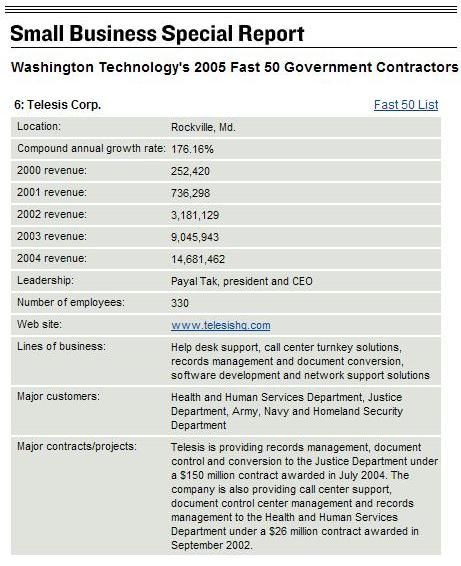| |
|
|
Yesterday on the
floor of the senate,
Senators Kent
Conrad, Thune,
Coleman and a few
others were talking
about the importance
of a loan or aid
package for farmers
in the Dakotas and
Minnesota because of
the severe drought
of the past several
years. The
situation for these
farmers has hit
critical. If they
can't get some kind
of aid or loans,
they will be forced
out of
business. Despite
the fact that the
bill limits the
loans to under
$100,000 and there
are limits on the
income levels of the
recipients, there
were opponents to
the bill who
suggested that the
whining farmers seek
assistance
elsewhere.
The response was
that FEMA doesn't do
droughts and the
farmers don't
qualify for Small
Business (SBA)
loans. The only
alternative left for
the farmers is the
senate bill.
Keeping in mind, these
American farmers who
grow food for
American citizens
and some of whom
have farms that have
been in their family
for generations,
consider the
following:
|
In 2005, Payal Tak
was honored with 52
others as Small
Business Persons of
the year. In
fact,
she has a lot of
awards which is
rather curious since
she's been in
business for such a
short period of
time.
Payal Tak is from
India. She
migrated here in
the mid 1980's, got her
degree in Computer
Science and
Telecommunications.
She
worked for Computer
Sciences Corporation
for several
years and then
started a business
in Maryland in 1998.
The
entire story was
available by
subscription only,
but the leading
sentence to her
accomplishments
began with: "She
led
a highly
successful
User
Acceptance Test
of a"
Telesis
is the name of her
business. It
is a Subchapter S
corporation and it
is located in
Rockford MD
|
|

Payal Tak
|
|
|
|
From the January 2006 edition
of the SBA Newsletter,
"Women's Perspective"
"After completing her
education Payal took a
corporate job and soon
recognized her ability for
effective customer service and
management.
She established Telesis
Corporation in September 1998
to provide information
technology services to the
Federal Government and
commercial industry. The
corporation provides services
in the areas of call center
solutions, records management,
document processing, software
and systems development and
network engineering…
By repeatedly delivering upon
the promise of its tag line,
Telesis Corporation has become
one of the fastest growing SBA
8(a) Business Development
Program and HUBZone Certified
and woman-owned small business
in the metropolitan Washington
DC Area…"
|
Earnings History of
a "Disadvantaged
Business"
from
Washington
Technology

From INC.Com
Telesis
Rockville, Md.
- No.: 19
- Annual Growth: 870.9%
- Total Growth: 3,484%
- 2003 Revenue: $9 million
- Employees: 82
Expect to see Telesis on this list again next yearóthe company just landed a $150 million contract with the Department of Justice. CEO Payal Tak won't specify what the project is, but one of the firm's specialties is storing and indexing paper records digitally. Although Tak was born in the Punjab, this IT firm won't be sending work overseasóits government clients won't allow it for security reasons.
From USA Today in
October 2005
Telesis no.
28 (IT Services)
Three-year growth:
1894%
2004 revenue:
$14.7 million
Employees:
320
Founded:
1998, Rockville, Md.
What it does:
Provides IT services
and administration,
primarily to
government agencies.
Why it's growing:
As a certified
woman-owned
business, the
company has the
inside track on some
government
contracts. Plus,
many federal clients
require development
work to be done
onshore by
contractors with the
appropriate security
clearance, so CEO
Payal Tak, who has
the clearance and
does all of her
development in
Maryland, has a leg
up on the
outsourcers.
What's next:
In July, Telesis was
awarded a prime
contract by the
Bureau of Alcohol,
Tobacco, Firearms
and Explosives that
is worth at least
$90 million, and
perhaps as much as
$150 million.
Telesis as a "team
member" of INDUS
Technologies
"Coincidently",
there is a
Telesis in India.
Of course it
couldn't be related
to the Subchapter S,
small disadvantaged,
minority-owned, SBA
HUBZone IT business
in the U.S. could
it?
Could India have
trained and prepared
an army of their
citizens to
'migrate' to the
U.S. to attack the
U.S. economy from
the inside? I
do believe the
answer is 'yes'.
Based on my 15 years
in the business of
IT consulting -
including consulting
for government, the
growth of Telesis is
not real. It's
also unnatural that
Payal Tak was able
to skillfully
exploit government
programs that were
structured to
virtually ensure
financial - if not
professional
success. But
those things aren't
the only evidence.
Several years ago
I found an article
in the Financial
Express.
http://www.financialexpress.com/fe_full_story.php?content_id=52276
WIPRO
Chairman
Azim
Premji
while
“speaking
at a
seminar
organised
by the All
India
Management
Association
(AIMA) and
Bombay
Management
Association
(BMA)”.
The link
has since
expired -
but this
is a
direct
quote from
the
article:
“Addressing management students here, Mr Premji explained that when software services were being outsourced, it was done surreptitiously. This was done because it was the requirement of that time. The industry then stood witness to a vast number of layoffs.”
Who is
Azim
Premji?
He was in
the news
recently
saying
that
Americans
need to
study more
math.
(If
Americans
were given
the same
kind of
business
advantages
as Payal
Tak, I
don't
think we'd
need more
math... we
just need
cracker
jack box
degrees
from
correspondence
schools
and inside
connections
for
government
contracting.)
Outsourcing
exec to
U.S.: Do
the math
1. He finished his bachelor's degree in electrical engineering from Stanford University through a special correspondence program more than 30 years after leaving the school in 1966 to head up Wipro after his father's death.
2. India's government gave him the Padmabhushana, one of the highest civilian awards in the country.
3. He established the Azim Premji Foundation, dedicated to creating equitable education across India.
4. In 2004, Time magazine listed him as one of the world's 100 most influential people.
5. Though Forbes estimates his wealth at $13 billion, he drove a Ford Escort until two years ago. Now he drives a Toyota Corolla.
Administrative Coup
d'etat
The Times
of India,
March 19,
2000
|
|
|
|
|

